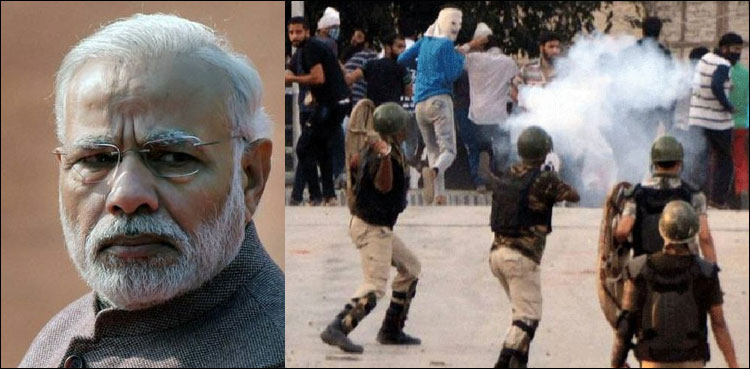
NEW YORK: A noted Indian journalist says he holds Prime Minister Narendra Modi’s “militaristic approach” responsible for the increasing killings in occupied-Kashmir, and blamed him and his Hindu nationalist party of now exploiting the deaths of paramilitary soldiers in Pulwama for political gains ahead of the national elections.
Hartosh Singh Bal, a seasoned journalist, wrote in an article published in The New York Times Sunday that Modi’s Bharatiya Janata Party has governed India and been part of the local government in occupied Kashmir as well, thus controlling India’s policy approaches to the “disputed, conflict-torn region,” reported the APP.
“Mr Modi embraced a militaristic approach and shunned a political process involving dialogue with people in Kashmir,” Bal wrote in the op-ed.
“Consequently, the number of civilian and security personnel killed in the region have increased, and a growing number of young Kashmiris, like Adil Dar, the 19-year-old, joined militant groups,” he said.
Read: Complete shutdown being observed in occupied Kashmir today
The Indian journalist wrote: “These are inconvenient facts for Mr Modi, who has continually attacked India’s opposition parties for being soft on terror and compromising national security. As the deaths of the soldiers come three months before a general election, an honest evaluation of Mr Modi’s failed policy should have led to him to being held accountable.
“Such questions, naturally, receded into the background in the immediate aftermath of the Kashmir bombing, in a national outpouring of grief. Before those pertinent questions would return to the national conversation, Mr Modi spun the bad news to his advantage by turning the grief into an emotive and prolonged commemoration of the deaths of the soldiers.
“As Indian television networks followed the coffins of the slain troops draped in the Indian flag on their final journey home, Mr Modi’s party directed its senior leaders to attend the cremations, which were telecast live. The funerals became occasions for patriotic avowals, some genuine, some orchestrated, as politicians sought to ensure they were part of the frame.
“Mr Modi ratcheted up the rhetoric against Pakistan and suggested that India would retaliate militarily. ‘Security forces have been given complete freedom, the blood of the people is boiling,’ he said.
“On social media and television networks, retired military generals, such as G.D. Bakshi, echoed Mr Modi’s words and described the bombing in Kashmir as an act of war. ‘They started it but we will finish it,’ he said.
“The venerable Cricket Club of India, a colonial institution founded in 1933, decided to do its part by draping a portrait of Pakistan’s prime minister, Imran Khan, which had been put up to honor his cricketing feats in the last century.
“The mourning took on a more sinister note as gangs of young men started parading the streets of many Indian cities, including New Delhi, shouting slogans directed at Pakistan and ‘anti-nationals’ — the preferred term of the Hindu nationalists for perceived foes and undesirables ranging from liberals to Muslims.
“Several Hindu nationalist affiliates of Mr Modi’s party led a campaign that targeted students from Kashmir studying in educational institutions across India. They managed to extract promises from a few colleges that they would not admit Kashmiri students,” he wrote.
“Mr Modi and his party seem to be working on a template of exploiting calamitous deaths that they have used before. In February 2002, soon after he took over as chief minister of the western Indian state of Gujarat, a train carrying Hindu religious volunteers was allegedly set on fire in the town of Godhra by a group of Muslims. Fifty-nine people died.
“Mr Modi ensured the bodies of the dead were taken to the Ahmedabad, the largest city in the state, and paraded through the city. Violence broke out soon after. Hindu mobs fueled by incendiary rhetoric from leaders of organizations affiliated with the Bharatiya Janata Party, targeted homes and businesses owned by Muslims. Over a thousand people were killed, over 700 of them Muslims,” he recalled.
Also read: Sikhs in India open their doors for Kashmiris; offer them food, protection
“Mr Modi is at his political best with an electoral campaign run on sectarian and polarizing themes. Before the attack in Kashmir, he was facing an opposition campaign dominated by questions about unemployment being the highest in 45 years and distress in Indian villages. His party had already lost state elections in Madhya Pradesh and Rajasthan, partly as a result of an acute farm crisis in India.”
“In 1999, I was working as a reporter in the northern state of Punjab. I covered the cremations of soldiers who had died in Kargil in the war between India and Pakistan. Each body draped in the Indian flag was accompanied by a soldier from the fallen man’s unit, he recalled, adding “Those men were angry with the government and willing to speak on record with their names and ranks about being been sent to battle in the icy Himalayan mountains without proper equipment to shield them from the cold and the snow.”
When I wrote their stories, my editors refused to publish them and argued that it was not the time to report such things because they were damaging to the ‘national interest,’ he recounted.
The post ‘Modi’s “militaristic approach” responsible for occupied-Kashmir deaths,’ Indian journalist writes in NYT appeared first on ARYNEWS.
from ARYNEWS https://ift.tt/2EsTGwp
via IFTTT



No comments:
Post a Comment